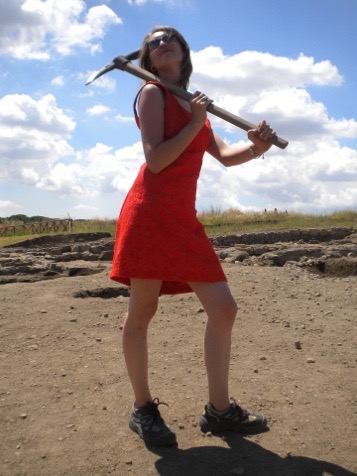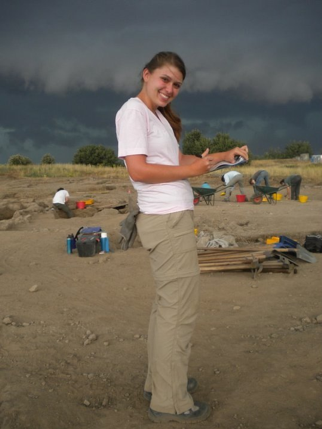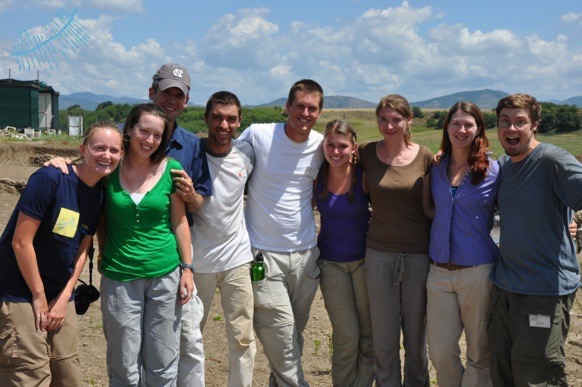ICCS students have the opportunity to apply for summer internships with the University of Michigan's excavations at Gabii. Below are comments from ICCS alumnus Jeffrey Becker who manages the Gabii Project and from two recent ICCS alumni who have served as interns at Gabii.
Message from Jeffrey Becker ’98
Those of us who have studied at the Centro know the value of experiencing antiquity firsthand – up close and personal, if you will suffer the phrase. Being at the Centro we have walked Rome’s streets, poked around in sites and museums, looked out at the panorama of the city on the Tiber countless times while perched near the Fontana dell’Acqua Paola or from the vantage point of the Garibaldi monument. It was my own immersion in Rome and Italy that helped me to realize the potential in my passion for the past, and thus began a career in Classical archaeology. Looking back at the Centro, it remains a guide for my own study and teaching of Mediterranean antiquity. Since 2007 I have been one of the principal investigators of the University of Michigan’s Gabii Project and since 2009 I have been lucky to co-coordinate our field program for students. At this point more than 100 student volunteers have participated in our program, which completed its third iteration just more than one month ago. In 2011 we were especially lucky to be partners with ICCS and to have a number of ICCS students – past, present, future – on our team. I am pleased to share with the iccsnews.com readers the reflections of two of our 2011 team members, one who had just completed her term at the Centro and one who is about to begin a Centro semester in a few days.
Jeffrey A. Becker Ph.D. RPA
ICCS Spring 1998
Acting Director, Ancient World Mapping Center,
The University of North Carolina at Chapel Hill
and
Managing Director, the Gabii Project
A Centrista’s viewpoint - Alison Rittershaus, Spring ‘11
In the intervening month between finishing up my semester of study at the Centro and before beginning work on the Gabii Project, I found it hard to imagine that any other Classics-based program could come to hold my affections as much as ICCS. But the group of people working to excavate the ancient city of Gabii proved me wrong, and quickly. Both ICCS and the Gabii Project are intensive experiences, with more hard work than one might expect and a rapid learning curve, and in their own right each offers its students an enriching period of growth and learning. The opportunity to attend both programs in quick succession enhanced the strengths of each and I am so grateful that I was able to be a part of both communities this year.
The power of pairing the studies undertaken at the Centro with the hands-on fieldwork of the Gabii Project stems from their emphases on different stages of the ever-growing organism of Classical archaeological practice. At the Centro, bi-weekly field trips and research projects introduced us to the study of previously excavated archaeological remains. We learned the canonical opera of Roman buildings, explored sites such as Alba Fucens in order to familiarize ourselves with the typical building plans of certain types of Roman buildings, such as the basilica or macellum, and read through archaeological reports and other secondary literature in order to come up with original interpretations of and arguments about existing sites.
The Gabii Project offers its students a site full of mystery and surprise. The city is brimming with unusual finds, including such features as walls that do not seem to match the overarching orientation of a structure, grave pits dug into the bedrock that once served as the foundation for houses, and complicated multiple phases for single structures that require staff and students to constantly readjust and explore possible conclusions about their appearance and uses. The Centro teaches its students how to apply the canonical ideas developed through widespread archaeological excavation all throughout the Roman world; the Gabii Project is at the forefront of the development of new discoveries that will someday be taught to students and offers a first glimpse at the process of weaving together the aggregated data of the ancient world into a legible roadmap that will inform both past and future excavations.
Together, the two programs create students who can appreciate that while the Classics is an old discipline, it is far from dead. There is so much new information to be gathered, such a multitude of ways that a single piece of material culture can be read, and even the smallest sherds of pottery can add to the larger, ever-expanding corpus of information of the subject. The most powerful assets that the two programs have are their dedicated staffs, whose passion and energy are at all times palpable and infectious to their students. My professors at the Centro were the most engaged and dedicated teachers I have had the fortune to learn from at the college level, and the staff members of the Gabii Project are so enthusiastic about their profession that they seem to thrive on the opportunity to share their knowledge with newcomers.
Coming off from nearly seven months of on-site work in Italy, I am returning for my senior year of college with a fresh and intensified love of the Classics, eager to continue putting into practice everything that I have been taught. Through these two programs I was able to completely immerse myself in the world of ancient Italy, and have gained a huge appreciation for the hard work that continues to create the field of Classics, and I look forward to continuing in their footsteps.
Alison Rittershaus, Harvard University, class of 2012

Looking back at Gabii, looking ahead to the Centro Sabina Ion, Fall ‘11
With my semester at the Centro soon approaching, I look forward to expanding my experiences with the field of Classics. I enter the Centro having spent two years in the field doing archaeology with the University of Michigan’s Gabii Project. When we go on site visits I can appreciate the hard work archaeologists have put into excavating and preserving the remains of the ancient settlements and monuments. I have experience with what the beginning stages of excavation look like and I look forward to seeing other sites in their excavated state. In addition, I have to credit the Gabii Project with my upcoming participation at the Centro. From my first week in the field with two alumni the idea of a semester immersed in Classics sounded simply wonderful. Not only does the coursework interest me, but based on my experience with the people who have been on this program I fully anticipate meeting people who will enrich and influence my life as a Classicist.
Sabina Ion
University of North Carolina at Chapel Hill, class of 2013

Centristi Working on the Gabii Project
Summer 2011

[Left to right:] Bailey Benson (ICCS spring 2010; University of Pennsylvania); Hilary Becker (ICCS spring 1998; now Visiting Assistant Professor of Classics, Davidson College); Jeffrey A. Becker (ICCS spring 1998; now Managing Director of the Gabii Project and Acting Director of the Ancient World Mapping Center, University of North Carolina at Chapel Hill); Sabian Hasani (ICCS fall 2009; University of Michigan;); Jeffrey Samuels (ICCS fall 2009; University of Pennsylvania); Sabina Ion (ICCS fall 2011; UNC-Chapel Hill); Alison Rittershaus (ICCS spring 2011; Harvard); Evelyn Adkins (ICCS spring 2005; University of Michigan); Tim Hart (ICCS spring 2005; University of Michigan).
We received the following message from Nic Terrenato and Jeffrey Becker ’98 regarding ICCS’s participation in the Gabii Project this summer: “We have had a great and productive 2011 field season at Gabii - a great deal of new information about the ancient city is unfolding. We wanted to share with you the photo above of current, former, and future Centristi who participated in this year's campaign. We are grateful for our relationship with ICCS and we hope to recruit even more ICCS students for the 2012 campaign.” Congratulations to all Centristi for a successful summer! We look forward to learning more about your research efforts.